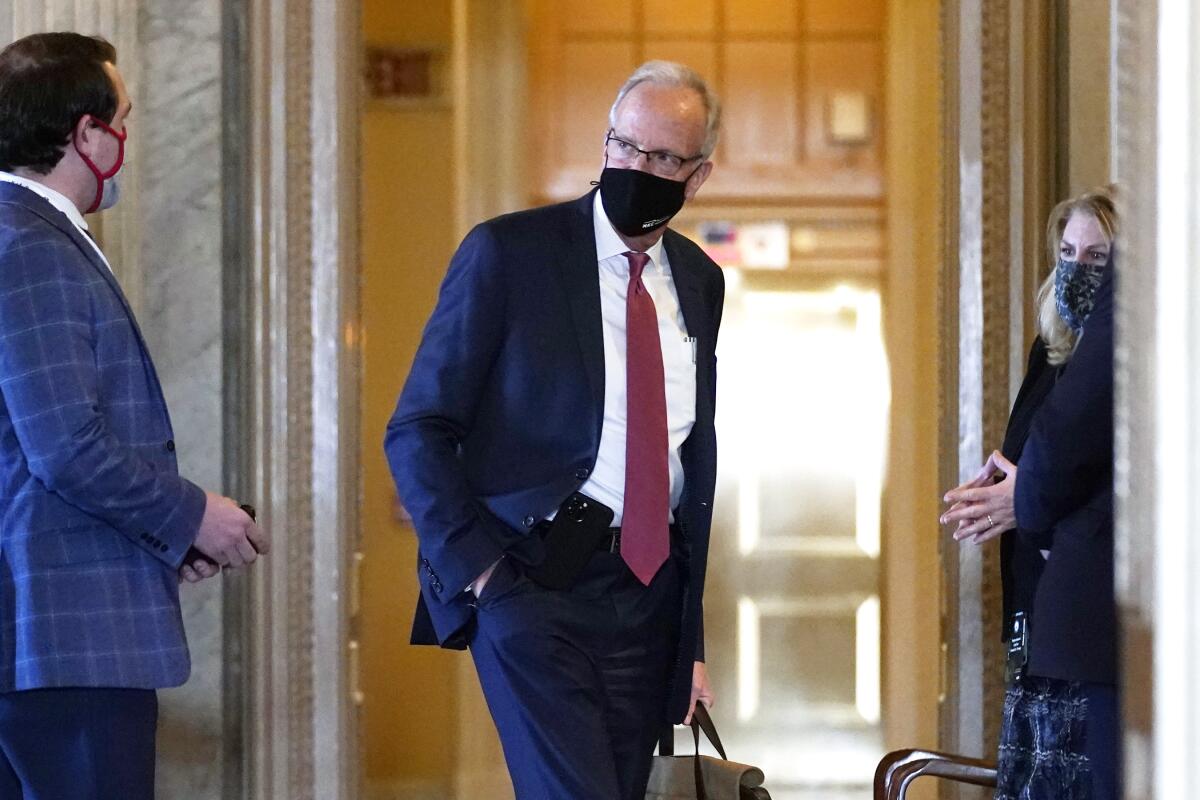The GOP arguments against making the IRS more effective are ridiculous

- Share via
Building and repairing roads, bridges and other public works projects is one of the few acts of government that draw bipartisan support — at least in theory. In practice, congressional Republicans have balked in recent years at ambitious infrastructure proposals, unwilling to raise the funds needed to pay for them.
That’s why the bipartisan infrastructure framework unveiled last month by 10 Senate Democrats and Republicans was considerably smaller than President Biden’s $2.2 trillion American Jobs Plan, proposing less than $600 billion in new spending. To avoid crossing a GOP red line, the group sought no tax hikes, just a collection of spending shifts and restraints.
But now, as the negotiators try to work out the fine details, some Republicans and conservative interest groups are squirming over provisions that were supposedly settled. Their complaints carry more than a whiff of pretext.
One of the main points in dispute is that the spending would be paid for in part by beefing up the Internal Revenue Service’s enforcement of tax laws. Spending $40 billion more on the IRS could raise $100 billion over the coming decade, supporters of the bipartisan plan say. By some other estimates, the return could be even higher.
The target here is what policymakers call the “tax gap,” which is the difference between what individuals and businesses owe and what they actually pay. The IRS estimates that taxpayers underpay by hundreds of billions of dollars every year, belying the idea that taxes are as certain as death. And one reason for the gap is that Congress has winnowed the IRS’ funding, particularly in its enforcement arm, which has been cut by more than a quarter since 2010.
Every president since Ronald Reagan has sought to narrow the tax gap, including Donald Trump, who famously bragged in 2016 about contributing to the problem. And yet some Republicans and their allies are pushing back against the idea now. For example, Sen. Jerry Moran (R-Kan.) told Politico that increasing enforcement “has some red flags” among Republicans, apparently because they fear they’ll be singled out for audits.
But what’s a greater outrage — the idea that more people will have to show the IRS their receipts, or the fact that tax cheats can get away with fraud on a scale that the typical taxpayer can’t even imagine? The biggest contributors to the gap aren’t wage earners and small investors, whose income is dutifully reported to the IRS by their employers and mutual funds. They are people with the means to shield their income in elaborate and hard-to-penetrate shell games.
What’s really bothering Republicans here may be that the fear that the bipartisan infrastructure bill is a gateway to much more spending. Democrats plan to follow that proposal with a much larger (about $3.5 trillion) and broader package of investments that would be financed primarily with tax increases.
But the two measures shouldn’t be conflated. The public strongly supports more spending on infrastructure because of the daily reminders of the need for better transportation, water, energy and communications systems. Republicans should stop looking for excuses to back away from what could be a significant bipartisan achievement for this polarized Congress.
More to Read
A cure for the common opinion
Get thought-provoking perspectives with our weekly newsletter.
You may occasionally receive promotional content from the Los Angeles Times.









